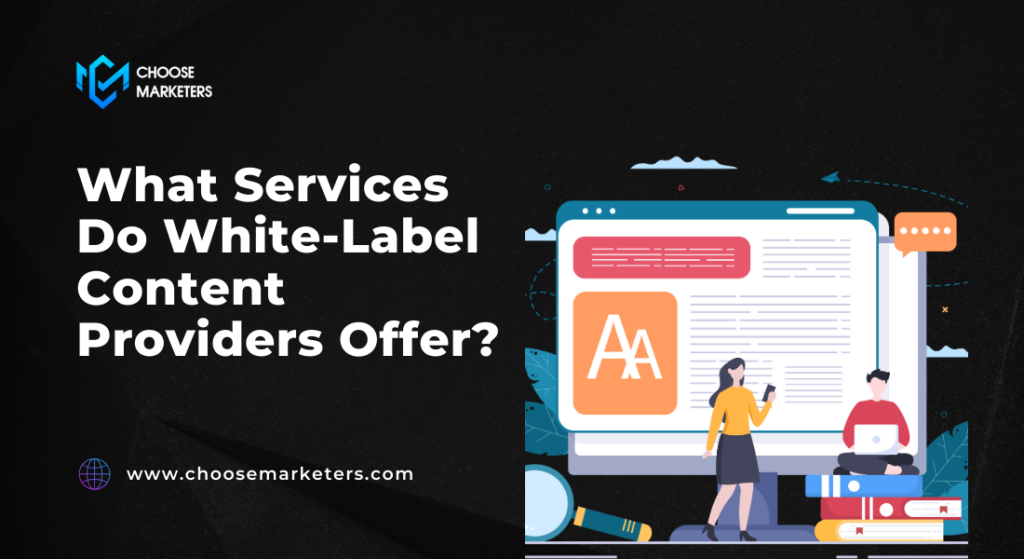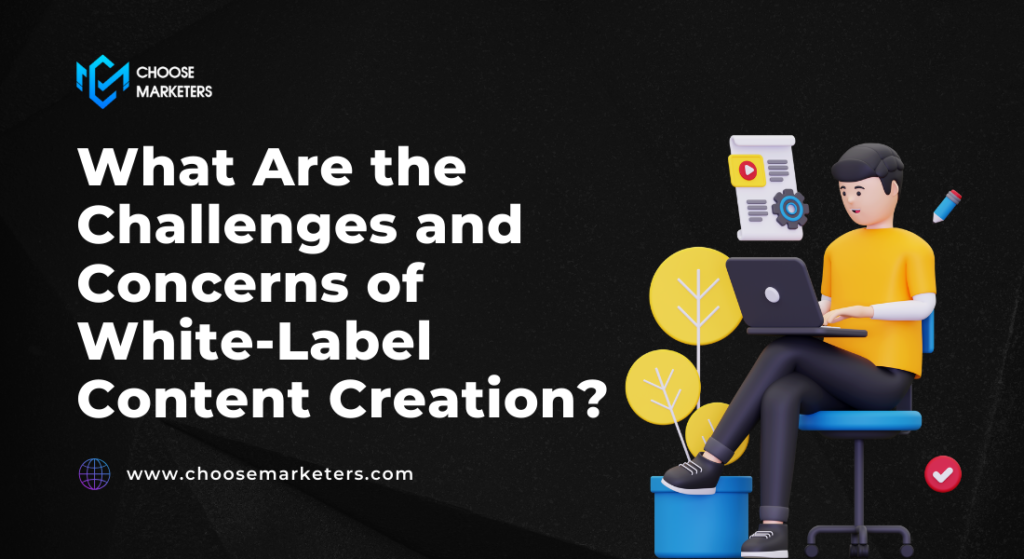

Why White-Label Content Creation Is Crucial for Scaling Your Business
What is White-Label Content Creation and Why is it Crucial for Your Business?
White-label content creation has emerged as a solution to meet these demands. White-label content creation involves outsourcing content production to a third-party provider. The content is then sold to another company, which rebrands it as their own. This service enables marketing agencies and businesses to deliver high-quality content without the need for an in-house writing team. It also simplifies the complexities of content production.
Why is White-Label Content Creation Important?
Cost-Effective Solution
One major benefit of white-label content creation is cost-efficiency. Businesses avoid hiring full-time writers or investing in expensive content tools. Instead, they rely on third-party services. This version uses concise sentences while maintaining clarity. These services deliver high-quality content at a much lower cost. This helps agencies save money while still offering premium content to their clients.
Scalability
As your business grows or as you take on more clients, scaling content production can be a challenge. White-label content providers offer a scalable solution, enabling businesses to expand their content offerings quickly and easily. You can increase production of blog posts, articles, or social media content without hiring more staff or using extra resources.
Expertise and Specialization
White-label content providers are often experts in their field. Many have specialized teams with industry experience, enabling them to create relevant, well-researched content. Their work aligns with current SEO practices and market trends, ensuring high-quality results that deliver value to the target audience.
Time Efficiency
Time is one of the most valuable resources for any business. White-label content creation saves marketing teams time by letting them focus on strategy, client relationships, and campaign execution. The content provider manages daily writing and content tasks.
Why Choose White-Label Content Creation? Benefits for Your Business
White-label content creation offers numerous advantages for businesses, especially for those in the marketing and B2B sectors. As the demand for quality content rises, businesses face the challenge of maintaining high standards. Partnering with a reputable white-label content provider offers a solution. It helps companies meet content needs without investing in extra resources. Below, we explore the benefits of white-label content and why it is a strategic choice for businesses.
Cost Efficiency and Resource Savings
One of the primary reasons businesses opt for white-label content creation is its cost-effectiveness. Instead of hiring a full in-house content team, which can be expensive, outsourcing to a white-label provider can help reduce overhead costs. White-label content services are typically more affordable than managing an internal team. Internal teams come with expenses like salaries, benefits, and training. Outsourcing content creation allows businesses to reallocate resources to strategic areas such as client acquisition, SEO optimization, and marketing campaigns. It also gives companies access to professional-grade content at a fraction of the cost of hiring specialized writers or agencies.
Scalability and Flexibility
Another major benefit of white-label content creation is its scalability. As your business grows, so does the need for more content. White-label providers offer the flexibility to scale your content production up or down based on demand. This is particularly useful for marketing agencies, which often face fluctuating workloads depending on client needs.
When you partner with a white-label content provider, you can easily increase your content output. This eliminates the hassle of recruiting or managing additional writers. Whether you need blog posts, social media content, or full-scale content strategies, white-label services can handle it all. They are equipped to manage diverse content requirements with ease. This scalability ensures that you never fall behind in meeting deadlines or quality expectations.
Access to Expert-Level Content
White-label content providers often employ teams of specialized writers who are experts in various industries and niches. This allows businesses to access high-quality, well-researched, and targeted content without needing to hire an expensive team of subject-matter experts. Whether you’re in tech, finance, or any other industry, white-label content services align content with the latest trends, relevant information, and best practices.
“These providers know content marketing strategies and ensure they produce optimized content for SEO, engagement, and lead generation.
These providers know content marketing strategies and ensure they produce optimized content for SEO, engagement, and lead generation. For example, agencies can rely on white-label services to create blog posts optimized for specific keywords, or articles that boost domain authority through link-building tactics.
Time Efficiency and Focus on Core Competencies
White-label content creation frees up valuable time for businesses, enabling them to focus on high-level activities such as strategy development, client relationships, and campaign management. Content production, especially at scale, can be time-consuming and requires careful attention to detail. Outsourcing this task to a white-label provider allows businesses to offload content production, ensuring that they can focus on what matters most without compromising quality. For marketing agencies, time saved on content creation can be redirected toward growing their business, enhancing client services, and exploring new opportunities. The efficiency gained by using a white-label content provider enables agencies to deliver quicker turnaround times for clients, improving overall client satisfaction.
Improved SEO and Increased Organic Traffic
Effective SEO content creation is essential for improving online visibility and driving organic traffic to websites. White-label content providers create SEO-optimized content, targeting the right keywords, structuring content for maximum search engine visibility, and implementing internal linking strategies. By using white-label content, businesses can offer their clients high-quality, SEO-friendly blog posts, articles, or landing pages that boost search engine rankings. This not only helps clients rank higher in search results but also increases traffic and generates more leads. For B2B companies, white-label content is a crucial element in any digital marketing strategy, directly impacting inbound marketing success.
What Services Do White-Label Content Providers Offer?

White-label content services are designed to help businesses scale their content operations efficiently while maintaining high quality. These services can cover a wide range of content types, each tailored to the specific needs of businesses and their target audiences.
Content creation to experienced providers, businesses can ensure that their content aligns with the latest industry trends, SEO strategies, and audience engagement tactics.
Below are the core services offered by most white-label content providers, demonstrating how they can add value to your content marketing strategy.
SEO Content Creation and Optimization
SEO content creation is one of the most common services offered by white-label content providers. As a vital part of any content strategy, SEO helps businesses enhance search engine rankings and drive organic traffic. Many businesses rely on white-label providers to create optimized content. SEO content typically includes:
- Word-optimized blog posts: These are designed to target specific keywords and phrases that are relevant to your business and audience, increasing visibility on search engines like Google.
- Landing page content: Well-crafted landing pages with targeted keywords, compelling copy, and clear calls-to-action are essential for converting visitors into leads.
- Product descriptions: These need to be optimized for both search engines and user engagement to help improve sales and drive traffic to eCommerce platforms.
white-label SEO content, businesses can focus on strategy while leaving the technical aspects of SEO content creation to experienced writers and SEO specialists.
Blog and Article Writing
White-label content providers often specialize in producing blog posts and articles that are informative, engaging, and SEO-optimized. Blog content is crucial for maintaining an active online presence, driving traffic, and establishing thought leadership in your industry. The services typically include:
- Long-form blog posts: These articles provide in-depth coverage of topics relevant to your audience, ensuring that they are both informative and shareable.
- Regular blog updates: For businesses that need frequent content to keep their audience engaged, white-label providers can create blog posts on a consistent schedule, freeing up time for agencies to focus on other marketing tasks.
- Guest posts: These can be used to build backlinks, improve domain authority, and increase your brand’s exposure across different websites.
White-label blog writing ensures that businesses always have fresh content to keep their blogs active and help them rank for competitive keywords.
Social Media Content and Management
Social media is a crucial part of any digital marketing strategy, and many white-label content providers also offer social media content creation and management services. This includes creating posts, scheduling content, and engaging with followers on behalf of businesses. services often include:
- Social media posts: These can range from promotional posts to informative infographics and customer engagement content. White-label providers create posts that align with your branding and resonate with your audience.
- Content calendars: A content calendar ensures that social media content is consistent and planned in advance, saving time for agencies while maximizing outreach.
- Engagement strategies: Some white-label services even include community management, responding to comments and fostering engagement to boost brand loyalty. Social media content creation, businesses can ensure their social media presence is always active, engaging, and aligned with their marketing goals.
How Does White-Label Content Creation Work? The Step-by-Step Process Explained
White-label content creation is a highly efficient process that allows businesses to scale content production without the need to build large in-house teams. By partnering with specialized content providers, businesses can access high-quality, customized content that meets their specific needs. However, understanding how this process works can help businesses make the most of white-label content creation. We explore the typical workflow involved in creating and delivering white-label content.
1.Initial Consultation and Needs Assessment
The first step in the white-label content creation process involves an initial consultation between the business (or agency) and the content provider. This stage is crucial as it establishes the foundation for the entire project. During this phase, businesses share their goals, target audience, content requirements, and any specific guidelines for tone, style, and formatting. Activities in this phase:
Client objectives discussion: Understanding the purpose of the content—whether it’s to increase website traffic, generate leads, or build brand authority.
Target audience profiling: Defining the demographics, interests, and pain points of the audience to ensure the content resonates with them.
Brand voice and tone: Clearly outlining the brand’s voice and tone to ensure consistency across all content pieces.
Content strategy planning: Determining the types of content required (e.g., blog posts, social media posts, ebooks) and the frequency of delivery.
2. Content Creation and Research
Once the objectives are clear, the white-label content provider begins the actual content creation process. This phase includes extensive research, drafting, and refining the content to align with the client’s goals and SEO strategies. Aspects of content creation:
In-depth topic research: Identifying relevant, high-quality sources of information that will enrich the content and make it authoritative. This is particularly important for industries requiring technical or specialized knowledge.
Writing the content: Experienced writers craft the content to match the client’s preferred style and tone, while also ensuring that it is engaging, informative, and optimized for SEO. Whether it’s a long-form blog post, social media content, or website copy, the content is structured to maximize both user engagement and search engine ranking.
3. Review and Approval
After the content is drafted, the next step is the review and approval process. White-label content providers typically include several rounds of revisions to ensure that the final product meets the client’s expectations and aligns with their content strategy. Some activities during this phase:
Internal review: The content provider’s internal team reviews the content to ensure it meets the client’s requirements and quality standards.
Client review and feedback: The client receives the content for feedback. At this stage, the business can suggest revisions, adjust the tone, or request additional information to include.
Based on client feedback, the content provider makes the necessary revisions to finalize the content and ensure it’s ready for delivery.
What Are the Challenges and Concerns of White-Label Content Creation?

While white-label content creation offers numerous benefits for businesses looking to scale their content marketing efforts, there are also some challenges and potential concerns that should be addressed before deciding to fully embrace this model. Understanding these potential pitfalls can help businesses mitigate risks and ensure they are making the right decision for their content strategy.
Quality Control and Brand Consistency
Maintaining quality control and ensuring that content aligns with the brand’s voice, tone, and quality standards is crucial in white-label content creation. While white-label providers are experienced in content creation, businesses must remain vigilant to ensure the output meets their expectations.
Consistency in Brand Voice
White-label content providers may create content for multiple clients, each with unique brand identities. Ensuring the content reflects your specific tone and style is essential. A mismatch in voice can confuse your audience and weaken your brand messaging.
Maintaining High-Quality Standards
Even though white-label providers employ professional writers, quality discrepancies may occur depending on the writer’s expertise or the topic’s complexity. Businesses should implement a thorough review and feedback process to uphold high standards.
Clear Communication and Regular Reviews
Businesses should maintain open communication with their content providers to ensure alignment with branding and quality standards. Clear guidelines and regular content reviews help achieve consistent and high-quality deliverables.
SEO Challenges and word Optimization
While white-label content creation typically includes SEO optimization, businesses must be cautious about how keyword research and optimization are handled. If done poorly, it can negatively impact a business’s search engine ranking.
- Overuse or underuse of keywords: Striking the right balance in keyword usage is crucial. Over-stuffing content with keywords can lead to penalties from search engines, while underutilizing keywords can result in poor rankings.
- Competition for keywords: With multiple businesses relying on the same white-label content providers, there’s a risk of keyword cannibalization, where multiple businesses might target the same keywords, making it harder for any of them to stand out.
Businesses should request customized SEO strategies from their white-label providers, ensure that keyword research is done specifically for their niche, and consider hiring SEO specialists to review content before publication.
Scalability Concerns
While white label content creation can scale quickly, there are potential issues with scalability that businesses should be aware of, particularly when working with larger volumes of content.
- Increased costs: As the volume of content increases, costs can also rise. White-label content providers may offer bulk content packages, but businesses may need to negotiate pricing or adjust their content strategy to ensure it remains cost-effective.
- Managing multiple projects: If businesses work with multiple departments or teams, coordinating and managing several content projects simultaneously can become a logistical challenge, especially if the content is being delivered by different providers.
To address scalability challenges, businesses should establish a well-defined content strategy, including project management systems, content calendars, and a single point of contact with their white-label provider. This helps keep projects organized and ensures that scaling content doesn’t lead to inefficiencies or increased costs.
How to Select the Best White-Label Content Partner? Factors to Consider
Choosing the right white-label content provider is a critical decision that can greatly impact the success of your content marketing strategy. With the right partner, you can efficiently scale your content production, maintain high quality, and improve SEO rankings. However, selecting a provider that aligns with your specific business goals and values requires careful consideration. Here’s a comprehensive guide on how to select the best white-label content partner for your needs.
Assess Their Content Quality and Expertise
When selecting a white-label content partner, it’s crucial to ensure they produce high-quality content that aligns with your brand’s voice and objectives. Content quality should be at the forefront of your decision-making process.
- Writing expertise: Ensure the provider has experienced writers who specialize in your industry or niche. This is particularly important for businesses operating in technical or specialized sectors where deep knowledge and industry expertise are needed.
- Samples and portfolio: Request writing samples or access to a portfolio to gauge the quality, style, and range of content produced by the provider. The content should be engaging, error-free, and reflect an understanding of SEO best practices.
- Customizability: The content should be easily customizable to fit your brand’s tone, messaging, and guidelines. Ensure the provider is flexible and willing to tailor content to suit your unique business needs
.
Evaluate SEO Knowledge and Strategies
Since SEO plays a pivotal role in content performance, it’s essential that your white-label content provider has a solid understanding of SEO and follows best practices in keyword research, on-page optimization, and content strategy.
- Word research: A reputable provider should conduct thorough keyword research tailored to your niche and business goals. They should target the right keywords based on search volume, competition, and relevance to your audience.
- On-page SEO: Ensure that the provider’s content is optimized for search engines, Quality and Expertise: Ensure the provider produces high-quality content with expertise in your industry.
- SEO Knowledge: The provider should have a strong understanding of SEO and implement best practices in keyword research, on-page optimization, and content strategy.
- Portfolio and References: Ask for samples or case studies to assess the provider’s work and reputation.
- Communication and Collaboration: Choose a provider that is responsive and open to feedback to ensure your content aligns with your goals.
- including proper use of headers, meta descriptions, image alt text, and internal linking. The content should adhere to SEO standards without keyword stuffing.
- Content strategy alignment: The provider should not only focus on writing but also help develop a content strategy that supports your broader marketing goals, such as increasing organic traffic, improving domain authority, or generating leads.
Check for Scalability and Flexibility
Your business’s content needs may evolve over time, so it’s essential to choose a white-label content provider that can scale with you.
- Ability to handle volume: If you plan to produce a high volume of content, ensure the provider can meet those demands without compromising quality or deadlines.
- Flexible services: The best providers offer flexibility in the types of content they create, whether it’s blog posts, social media content, website copy, email newsletters, or other forms of content. The provider should be able to adapt to your changing needs as your business grows and your content strategy evolves.
- Turnaround time: The provider should be able to deliver content on time, even during high-demand periods, to ensure that your content marketing efforts remain consistent and on schedule.
Review Client Testimonials and Reputation
A trusted white-label content partner should have a strong reputation in the industry. Check for client testimonials, case studies, and online reviews to evaluate the provider’s track record.
- Client feedback: Seek out client testimonials and feedback on their experiences working with the provider. Positive reviews and long-term client relationships are a good indicator of reliability and high-quality service.
- Case studies: Ask for case studies that showcase the provider’s success in working with businesses similar to yours. This will give you insight into their ability to produce results and scale content strategies.
- Industry reputation: A reputable white-label provider will have a strong presence and credibility in the content marketing industry. Look for providers with awards, industry recognitions, or thought leadership content to gauge their authority.
Commonly Asked Questions (FAQs) About White-Label Content Creation
1. What Is White-Label Content Creation and How Does It Work?
White-label content creation involves outsourcing the creation of content (such as blog posts, articles, social media posts, and more) to a third-party provider. The content is then branded as your own, meaning you can present it to your audience as if it were created by your internal team. White-label providers typically offer a full range of content services, including research, writing, editing, and SEO optimization.
2. What Are the Benefits of White-Label Content Creation?
White-label content creation offers several advantages, including:
Scalability: It allows businesses to produce large volumes of content without hiring additional staff.
Cost-Effectiveness: By outsourcing content creation, businesses can save on overhead costs such as salaries, benefits, and training.
Expertise: White-label providers bring industry-specific knowledge and experience, ensuring high-quality content tailored to your niche.
Time Efficiency: It frees up internal resources to focus on core business functions, while still maintaining an active and consistent content presence.
3. How Do I Choose the Right White-Label Content Provider?
When selecting a white-label content provider, consider factors such as:
Quality and Expertise: Ensure the provider produces high-quality content with expertise in your industry.
SEO Knowledge: The provider should have a strong understanding of SEO and implement best practices in keyword research, on-page optimization, and content strategy.
Communication and Collaboration: Choose a provider that is responsive and open to feedback to ensure your content aligns with your goals.
4. What Are Some Potential Challenges of White-Label Content Creation?
Although white-label content creation is highly effective, some challenges include:
Quality Control: Ensuring the content aligns with your brand’s voice and quality standards.
SEO Risks: Poor SEO practices can negatively impact rankings if the provider doesn’t optimize content properly.
Dependence on External Providers: Relying on a third-party provider may limit your control over the content creation process. To overcome these challenges, businesses should maintain clear communication, provide detailed guidelines, and review the content regularly.
5. Is White-Label Content Creation Suitable for Small Businesses?
Yes, white-label content creation can be highly beneficial for small businesses. It enables them to produce professional content without the need for in-house writers or a large marketing budget. Small businesses can leverage white-label content to enhance their online presence, improve SEO rankings, and compete with larger companies, all while focusing on their core operations. By outsourcing content creation, small businesses can maintain a consistent flow of high-quality content that resonates with their target audience.

